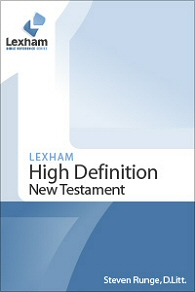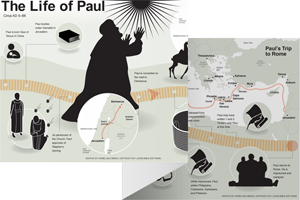Our understanding of the Greek New Testament is based almost entirely on English translations, but how would our understanding of the Greek text change if we read it for what it is: as Greek? With The Lexham Discourse Greek New Testament, we can now get behind the words of the New Testament writers and discover the particular linguistic tasks that inform translation and interpretation.
The Text
32 καὶ ἡμεῖς ἐσμεν μάρτυρες τῶν ῥημάτων τούτων καὶ τὸ πνεῦμα τὸ ἅγιον ὃ ἔδωκεν ὁ θεὸς τοῖς πειθαρχοῦσιν αὐτῷ
33 Οἱ δὲ ἀκούσαντες διεπρίοντο καὶ ἐβούλοντο ἀνελεῖν αὐτούς
34 ἀναστὰς δέ τις ἐν τῷ συνεδρίῳ Φαρισαῖοςὀνό ματι αμαλιήλ νομοδιδάσκαλος τίμιος παντὶ τῷ λαῷ ἐκέλευσεν ἔξω βραχὺ τοὺς ἀνθρώπους ποιῆσαι
35 εἶπέν τε πρὸς αὐτούς Ἄνδρες Ἰσραηλῖται προσέχετε ἑαυτοῖς ἐπὶ τοῖς ἀνθρώποις τούτοις τί μέλλετε πράσσειν
36 πρὸ γὰρ τούτων τῶν ἡμερῶν ἀνέστη Θευδᾶς λέγων εἶναί τινα ἑαυτόν ᾧ προσεκλίθη ἀνδρῶν ἀριθμὸς ὡς τετρακοσίων ὃς ἀνῃρέθη καὶ πάντες ὅσοι ἐπείθοντο αὐτῷ διελύθησαν καὶ ἐγένοντο εἰς οὐδέν
37 μετὰ τοῦτον ἀνέστη Ἰούδας ὁ αλιλαῖος ἐν ταῖς ἡμέραις τῆς ἀπογραφῆς καὶ ἀπέστησεν λαὸν ὀπίσω αὐτ oκἀκεῖνος ἀπώλετοκαὶ πάντες ὅσοι ἐπείθοντο αὐτῷ διεσκορπίσθησαν
Runge, S. E. (2008–2014). The Lexham Discourse Greek New Testament (Ac 5:32–37). Lexham Press.
Translation
The New Testament writers used a variety of literary and grammatical devices to help guide the reader. Some of these devices were intended to attract attention to important information, while others served to push less-important information into the background. Some were used simply to grab your attention, alerting you that something important or surprising was about to happen.
32 And we are witnesses to these things, and so is the Holy Spirit, whom God has given to those who obey him.”
33 When they heard this, they were enraged and wanted to kill them.
34 But a Pharisee in the council named Gamaliel, a teacher of the law held in honor by all the people, stood up and gave orders to put the men outside for a little while.
35 And he said to them, “Men of Israel, take care what you are about to do with these men.
36 For before these days Theudas rose up, claiming to be somebody, and a number of men, about four hundred, joined him. He was killed, and all who followed him were dispersed and came to nothing.
37 After him Judas the Galilean rose up in the days of the census and drew away some of the people after him. He too perished, and all who followed him were scattered.
Runge, S. E. (2008–2014). The Lexham High Definition New Testament: ESV Edition (Ac 5:32–34). Lexham Press.
Commentary
Faithlife Study Bible (FSB) is your guide to the ancient world of the Old and New Testaments, with study notes and articles that draw from a wide range of academic research. FSB helps you learn how to think about interpretation methods and issues so that you can gain a deeper understanding of the text.
Holy Spirit The work of the Holy Spirit to make the proclamation of the gospel effective and to perform miracles in the Church testifies to the reality of Jesus’ resurrection and salvation in Him.
5:33 infuriated The religious leaders’ rage contrasts sharply with the enthusiastic response to Peter’s first sermon (2:37).
5:34 Gamaliel A prominent rabbi and leader of the Pharisees during the nt period. Paul was his pupil (22:3).
put the men outside God intervenes through Gamaliel’s reasonableness in order to preserve the apostles’ lives.
5:36 Theudas The first-century Jewish historian Josephus mentions a Theudas who led a revolt around ad 44–46 (Josephus, Antiquities 20.97–98). This places Theudas’ revolt about a decade after the events in ch. 5. It may be that there was another rebel leader named Theudas (a relatively common name) since Gamaliel is referring to events that took place before the time Josephus mentions.
5:37 Judas the Galilean The Jewish historian Josephus mentions that this well-known figure led a revolt against Rome around ad 6 (Josephus, Antiquities 18.23; compare note on v. 36).
the census A census under Quirinius, the governor of Syria, in ad 6, later than the one taken around the time of Jesus’ birth (Luke 2:2).
Barry, J. D., Mangum, D., Brown, D. R., Heiser, M. S., Custis, M., Ritzema, E., Whitehead, M. M., Grigoni, M. R., & Bomar, D. (2012, 2016). Faithlife Study Bible (Ac 5:31). Lexham Press.



